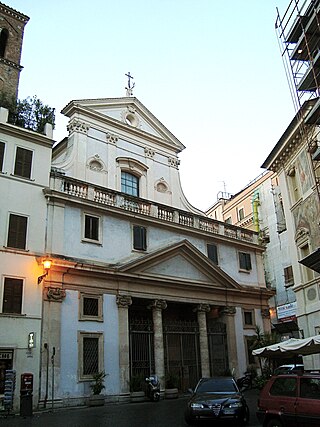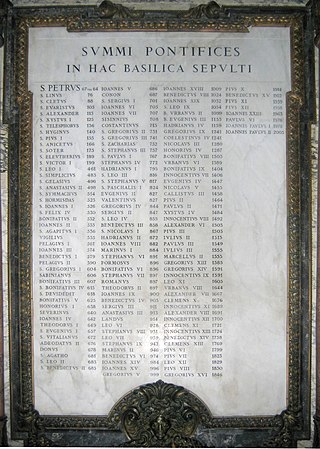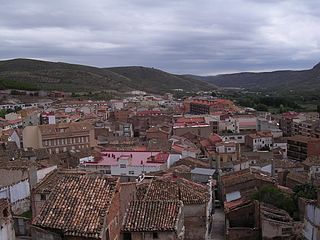An antipope is a person who claims to be Bishop of Rome and leader of the Roman Catholic Church in opposition to the legitimately elected pope. Between the 3rd and mid-15th centuries, antipopes were supported by factions within the Church itself and secular rulers.

Baldassarre Cossa was Pisan antipope as John XXIII (1410–1415) during the Western Schism. The Catholic Church regards him as an antipope for his opposition to Pope Gregory XII, whom it recognizes as the rightful successor of Saint Peter. He was also an opponent of Antipope Benedict XIII, who was recognized by the French clergy and monarchy as the legitimate Pontiff.
Year 1409 (MCDIX) was a common year starting on Tuesday of the Julian calendar.
Pope John XIV, born Peter Canepanova, was the bishop of Rome and ruler of the Papal States from December 983 until his death. Upon the death of Pope Benedict VII in July 983, Emperor Otto II nominated Canepanova to the papal throne after the abbot Maiolus of Cluny refused the office. The decision to install the then bishop of Pavia was made without consultation with the clergy and the Roman people, nor was it confirmed by formal election.

The Western Schism, also known as the Papal Schism, the Great Occidental Schism, the Schism of 1378, or the Great Schism, was a split within the Roman Catholic Church lasting from 20 September 1378 to 11 November 1417, in which bishops residing in Rome and Avignon simultaneously claimed to be the true pope, and were eventually joined by a third line of Pisan claimants in 1409. The event was driven by international rivalries, personalities and political allegiances, with the Avignon Papacy in particular being closely tied to the French monarchy.
John XVI was an antipope from 997 to 998.
Benedict XIV is a name used by two closely related minor antipopes of the 15th century. The first, Bernard Garnier became antipope in 1424 and died c. 1429. The second, Jean Carrier, became antipope c. 1430 and apparently left office, whether by death or resignation, by 1437.
Gregory VIII, born Mauritius Burdinus, was antipope from 10 March 1118 until 22 April 1121.

Pedro Martínez de Luna y Pérez de Gotor, known as el Papa Luna(lit. 'the Moon Pope') or Pope Luna, was an Aragonese nobleman who was christened antipope Benedict XIII during the Western Schism.

Antipope Paschal III was a 12th-century clergyman who, from 1164 to 1168, was the second antipope to challenge the reign of Pope Alexander III. He had previously served as Cardinal of St. Maria.
Candia Lomellina is a comune (municipality) in the Province of Pavia in the Italian region Lombardy, located about 50 kilometres (31 mi) southwest of Milan and about 45 kilometres (28 mi) west of Pavia. As of 31 December 2004, it had a population of 1,639 and an area of 27.8 square kilometres (10.7 sq mi).
Jacob Senleches was a Franco-Flemish composer and harpist of the late Middle Ages. He composed in a style commonly known as the ars subtilior.

Sant'Eustachio is a Roman Catholic titular church and minor basilica in Rome, named for the martyr Saint Eustace. It is located on Via di Sant'Eustachio in the rione Sant'Eustachio, a block west of the Pantheon and via della Rotonda, and a block east of Sant'Ivo alla Sapienza and the Via della Dogana Vecchia.

A papal name or pontificial name is the regnal name taken by a pope. Both the head of the Catholic Church, usually known as the pope, and the pope of the Coptic Orthodox Church of Alexandria choose papal names. As of 2013, Pope Francis is the Catholic pope, and Tawadros II or Theodoros II is the Coptic pope. This article discusses and lists the names of Catholic popes; another article has a list of Coptic Orthodox popes of Alexandria.
John of Oxford was a medieval Bishop of Norwich.

Illueca is a municipality located in the province of Zaragoza, Aragon, Spain. According to the 2004 census (INE), the municipality has a population of 3,396 inhabitants.
Pseudocardinals, quasi-cardinals or anticardinals were the uncanonical Cardinals created by six of the Antipopes, in or rival to Rome, including two of Avignon Papacy and one of Pisa, as princes of their schismatic government of the Catholic Church.

Peter of Candia, also known as Peter Phillarges, named as Alexander V, was an antipope elected by the Council of Pisa during the Western Schism (1378–1417). He reigned briefly from 26 June 1409 to his death in 1410, in opposition to the Roman pope Gregory XII and the Avignon antipope Benedict XIII. In the 20th century, the Catholic Church reinterpreted the Western Schism by recognising the Roman popes as legitimate. Gregory XII's reign was extended to 1415, and Alexander V is now regarded as an antipope.







